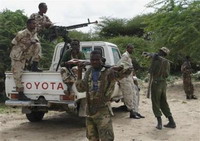Peacekeeping force to stay in Darfur despite killing of 10 peacekeepers
In spite of fears for the future of a new peacekeeping force, it will stay in Darfur.

Gen. Martin Agwai told the group known as "the elders" that the proposed force of AU and U.N. troops still lacked equipment, and even by January would have less than a third of the troops promised.
"Our president called me and assured me he understood our plan and would continue to support us," Agwai said, drawing applause from the delegates visiting El Fasher, the capital of North Darfur province.
Over the weekend, rebels overran an African peacekeeping base in northern Darfur, killing 10 - the deadliest attack on the force since it arrived in the region three years ago. Nigerian forces suffered the greatest losses in the assault, which drew condemnation Tuesday from the U.N. Security Council.
"The council condemns this murderous attack and demands that no effort be spared so that the perpetrators be identified and brought to justice," the council's statement said, after a day of disagreement over whether to call the assault a terrorist act perpetrated by rebels, as South Africa, Russia and some other council members wanted.
Nigerian's commitment is crucial because under the compromise reached between the United Nations and Khartoum's government, the majority of the new 26,000-strong joint force must be predominantly African.
The delegation led by Carter and Desmond Tutu is trying to use their influence at a crucial time - with peace talks due to start in Libya and deployment of the hybrid force to begin later this month.
Along with the joint force's chief, Rodolphe Adada, the Nigerian general said the mission still lacked crucial equipment.
Only one country, Jordan, has so far committed needed aircraft, Agwai told the delegates.
Agwai said there would be at most 8,000 troops in Darfur by January - only 1,000 more than the current force: "Facing the reality, how many African countries can provide troops that can fully sustain themselves here?"
The joint force is planned to replace on Jan. 1st the 7,000-member African Union mission that has struggled since it began in 2004, too understaffed and under-equipped to ensure peace in the vast desert region of western Sudan. Violence has only increased. Some rebels resent the peacekeepers, accusing them of doing little to protect refugees.
Agwai also deplored that "there are offers we can't accept," alluding to the Sudanese government's resistance to any non-African intervention in Darfur.
"It has been easier (to deploy a U.N. mission) in Liberia and Sierra Leone, because those were failed states. Whereas here is a fully functioning and operational state."
Carter said that "this is one of the worst descriptions of conditions for a military operation that I have ever heard."
The visit by the elders is largely a symbolic move by a host of respected figures to push all sides to make peace in Darfur, where more than 200,000 people have been killed and 2.5 million driven out of their homes in four years of violence.
"We hope that, as elders in a village, we will be able to share some of the wisdom and experience we have," Tutu told a gathering of community and tribal leaders.
The group includes 12 people and was founded two months ago, said billionaire businessman Richard Branson, who helped create it. The trip to southern Sudan and Darfur is its first mission. "The main purpose (of this trip) is to get fair elections in Sudan for 2009," Branson told the Associated Press in El Fasher.
The group visited a U.N. aid compound located next to the sprawling Abu-Shok and Es-Sallam camps where 150,000 refugees who fled Darfur's violence are living.
"We hope that you can contribute to put an end to this crazy war," said a nazir, or traditional leader among a group of about 30 men and women who came from the refugee camps to meet the delegation.
Earlier, the delegation met with the North Darfur governor, Youssouf Kebir, who insisted the security situation in the province is "stable and good."
But government forces have been waging a fierce offensive against rebels in North Darfur for the past two weeks. On Saturday night, amid the fighting, a force of 1,000 rebels overran a base of U.N. peacekeepers at Haskanita in North Darfur. In a battle that lasted into the early hours Sunday, the rebels killed 10 peacekeepers, looted the base then escaped when Sudanese troops moved in.
Darfur is scene of the world's largest humanitarian effort, trying to feed those hit by the turmoil. The conflict pits the Sudanese military against ethnic African rebels who rose up against discrimination by the Arab-dominated government. To help put down the rebellion, Khartoum is accused of unleashing Arab janjaweed militias who have burned hundreds of ethnic African villages, killing and raping civilians.
Subscribe to Pravda.Ru Telegram channel, Facebook, RSS!





